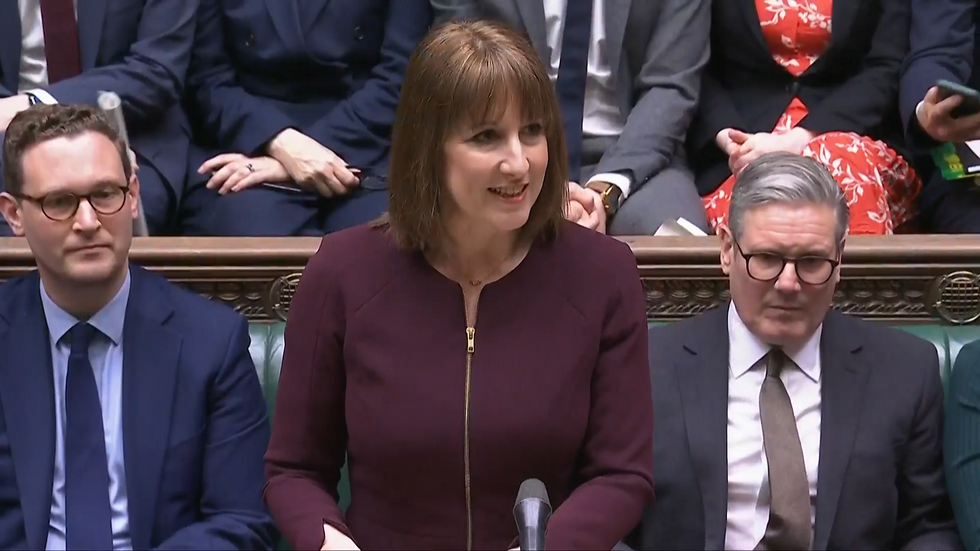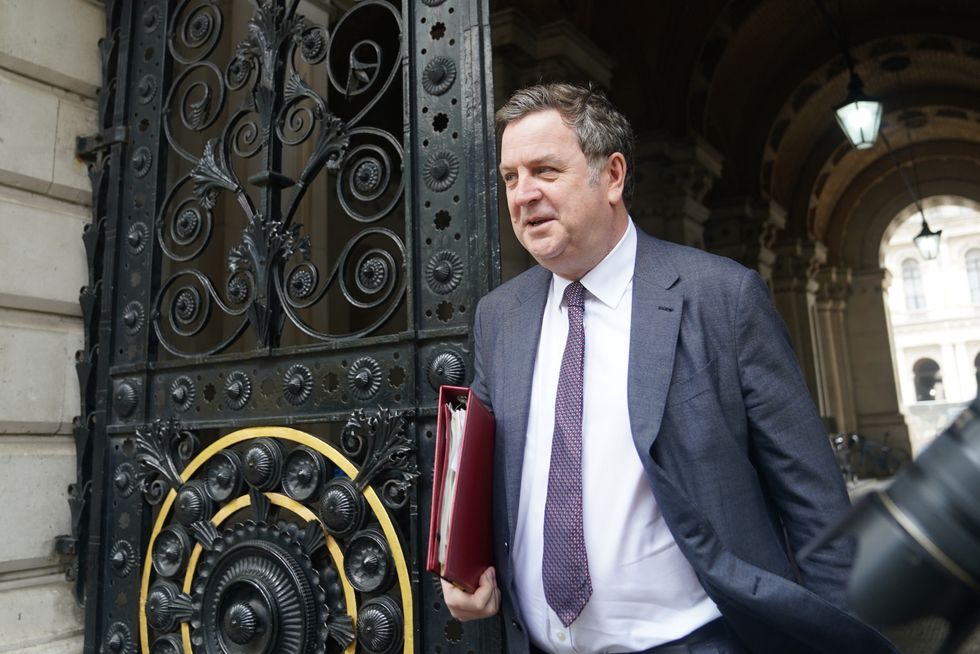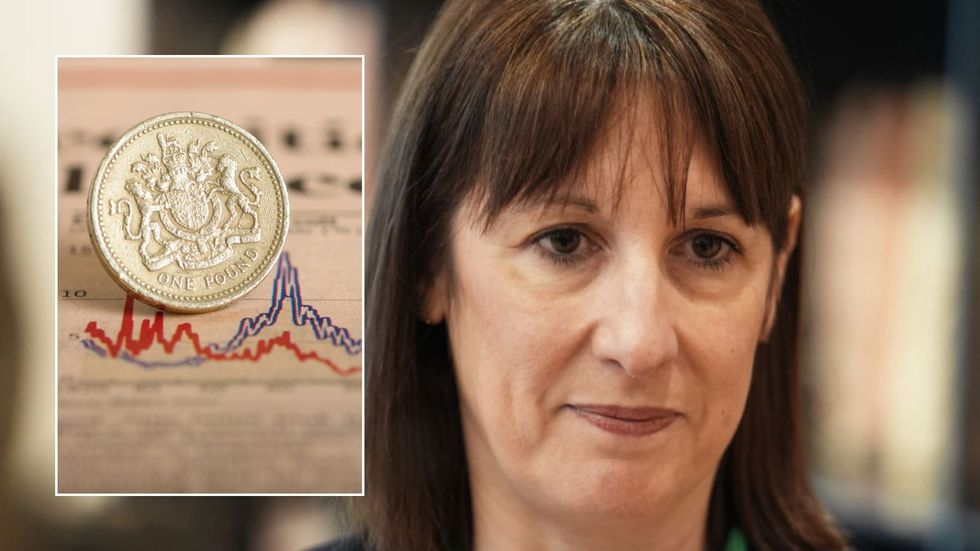Rachel Reeves goes quiet on tax as workers face onslaught in April and again in October
OBR warns ‘50 per cent chance of tax rises or spending cuts’ as Chancellor’s Spring Statement restores ‘sliver of headroom’
Don't Miss
Most Read
Trending on GB News
Britain should brace for an even more painful budget in October with tax rises and spending cuts all on the cards, the OBR has warned.
The financial watchdog downgraded the UK’s all-important growth forecasts today, putting Reeves and Labour in a precarious economic position and casting serious doubt over the party's mantra 'fixing the foundations'.
Even with the massive tax rises Reeves announced in her October budget, the Chancellor still needed growth to help pay for massive spending increases in the NHS, vast net zero projects and inflation-busting public sector pay rises.
Ms Reeves told MPs today: “I said at the election that we could not simply tax and spend our way to prosperity. We need growth.”

Rachel Reeves delivering the opening lines of her Spring Statement
PARLIAMENTLIVE.TVThat tax bombshell budget came with a slim £10billionfiscal headroom(essentially how much leeway the government has to cut taxes or increase spending while still sticking to its self-imposed rules).
But the punishing tax rises in the budget like the hike to Employers’ National Insurance spooked the markets and sparked an exodus of wealth and business confidence, evaporating the crucial headroom and tanking growth.
As a result, the Chancellor was forced to use the Spring Statement today (labelled an Emergency Budget’ by the Tories) to announce further cuts to welfare and the public sector in an attempt to balance the books.
By slashing universal credit and the civil service, Reeves rebuilt the £10billion fiscal headroom, but economists have warned this is not enough and leaves Britain vulnerable to world events.
Delivering her Spring Statement today, Rachel Reeves failed to speak about possible tax changes or the increase in the tax burden placed on Britons.
This comes as the burden is set to increase again in April on hard-working Britons as businesses face an increase in National Insurance and the tax thresholds continue to be frozen costing thousands for British households.

Mel Stride said Rachel Reeves had made Britain 'poorer and weaker'
PASpeaking of the outlook ahead of the autumn budget, Rob Wood, Pantheon Macroeconomics chief economist, said the forecasts show that the ‘fiscal outlook remains perilous’.
“We think the OBR will almost certainly have to cut potential growth forecasts this autumn, and we expect the Government to have to boost planned defence spending by another 0.5pc of GDP by 2027.
“So further tax hikes and borrowing are coming.”
Meanwhile, head of the IFS Paul Johnson said Reeves had left herself ‘at the mercy of events’, calling her headroom a mere ‘sliver’.
“All of that adds to uncertainty around policy. We can surely now expect six or seven months of speculation about what taxes might or might not be increased in the autumn,” he said.
On the point of uncertainty, commentators have highlighted several factors that could instantly derail the Chancellor’s restored headroom and tip the government back into the red.
Reeves planning reforms, for example, which will add an estimated £15billion into the UK economy by the end of the decade, were factored into the OBR’s analysis, despite this estimate being severely contested.
LATEST FROM MEMBERSHIP:

The OBR halved growth forecast for 2025 today, an embarrassing turn of events for Labour who staked so much on being a pro-growth government and inherited the fastest growing economy in the G7
GETTYIndustry experts warn Britain reforms could take years to materialise, and Britain remains an impossible place to build houses and infrastructure.
Another point raised was the fact the OBR’s analysis did not include the effects of Labour’s Employment Rights Bill.
Business groups, such as the Confederation of British Industry (CBI), argue that the bill could impose significant financial and bureaucratic challenges.
The CBI estimates that the reforms may add approximately £5 billion to annual business costs, potentially deterring investment and hindering hiring practices.
Telegraph Head of Money Ben Wilkinson highlighted how Reeves is already laying the groundwork for more punishing tax rises in the Autumn, just as she did before her last budget.
Before the last budget, Reeves repeatedly claimed she had found a £22billion black hole in the nation’s finances in an attempt to justify £40billion worth of tax rises.
In today’s Spring Statement, the Chancellor again referenced a variety of reasons why the OBR had halved growth forecasts, from Ukraine, Trump and even Liz Truss’ mini budget.
Commentators point to this as proof of Reeves attempting to give herself a ‘mandate’ to raise taxes further.
But there was one factor that didn’t warrant even a passing mention, and that was her own bombshell fiscal measures introduced in October, many of which helped tank the economy according to businesses and economists.
Other measures outlined in Reeves’ Spring Statement were a slashing of the bloated civil service with a voluntary redundancy scheme.
This will save £3.5billion a year in ‘day to day savings by 2029/30, says the Chancellor.
There is also a £2.2billion increase in defence spending and a huge £4.8 billion cut to welfare.
On the latter, this will come via the health element of universal credit being cut in half and frozen for new claimants.







